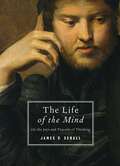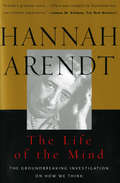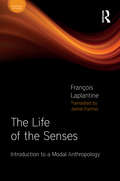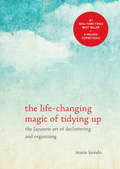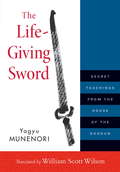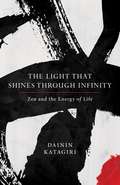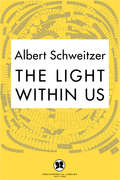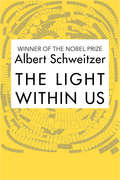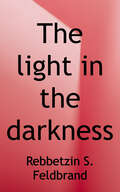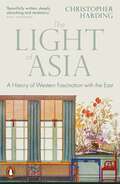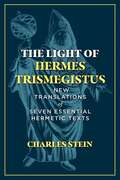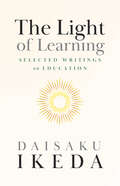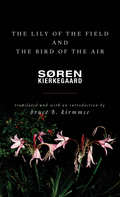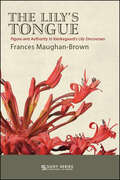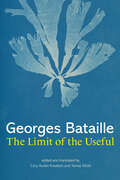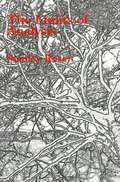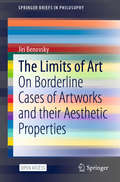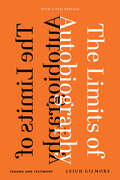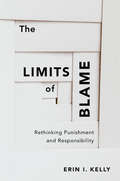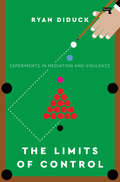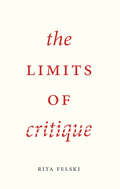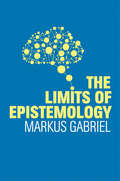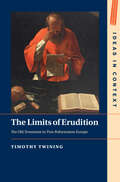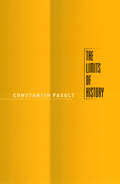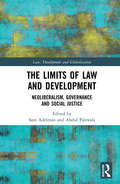- Table View
- List View
The Life of the Mind: On the Joys and Travails of Thinking
by James V. SchallIn The Life of the Mind, Georgetown University&’s James V. Schall takes up the task of reminding us that, as human beings, we naturally take a special delight and pleasure in simply knowing. Because we have not only bodies but also minds, we are built to know what is. In this volume, Schall, author of On the Unseriousness of Human Affairs, among many other volumes of philosophical and political reflection, discusses the various ways of approaching the delight of thinking and the way that this delight begins in seeing and hearing and even in making and walking. We must be attentive to and cultivate the needs of the mind, argues Schall, for it is through our intellect that all that is not ourselves is finally returned to us, allowing us to live in the light of truth.
The Life of the Mind: The Groundbreaking Investigation on How We Think
by Hannah Arendt&“A passionate, humane intelligence addressing itself to the fundamental problem of how the mind operates.&” —Newsweek Considered by many to be Hannah Arendt&’s greatest work, published as she neared the end of her life, The Life of the Mind investigates thought itself, as it exists in contemplative life. In a shift from her previous writings, most of which focus on the world outside the mind, this work was planned as three volumes that would explore the activities of the mind considered by Arendt to be fundamental. What emerged is a rich, challenging analysis of human mental activity, considered in terms of thinking, willing, and judging. This final achievement, presented here in a complete one-volume edition, may be seen as a legacy to our own and future generations.
The Life of the Senses: Introduction to a Modal Anthropology (Sensory Studies)
by François LaplantineBoth a vital theoretical work and a fine illustration of the principles and practice of sensory ethnography, this much anticipated translation is destined to figure as a major catalyst in the expanding field of sensory studies.Drawing on his own fieldwork in Brazil and Japan and a wide range of philosophical, literary and cinematic sources, the author outlines his vision for a ‘modal anthropology’. François Laplantine challenges the primacy accorded to ‘sign’ and ‘structure’ in conventional social science research, and redirects attention to the tonalities and rhythmic intensities of different ways of living. Arguing that meaning, sensation and sociality cannot be considered separately, he calls for a 'politics of the sensible' and a complete reorientation of our habitual ways of understanding reality.The book also features an introduction to the sensory and social thought of François Laplantine by the editor of the Sensory Studies series, David Howes.
The Life-Changing Magic of Tidying Up: The Japanese Art of Decluttering and Organizing (The Life Changing Magic of Tidying Up)
by Marie KondoThis best-selling guide to decluttering your home from Japanese cleaning consultant Marie Kondo takes readers step-by-step through her revolutionary KonMari Method for simplifying, organizing, and storing. <P><P>Japanese organizational consultant Marie Kondo takes tidying to a whole new level, promising that if you properly declutter your home once, you'll never have to do it again. Whereas most methods advocate a room-by-room or little-by-little approach, the KonMari Method's category-by-category, all-at-once prescription leads to lasting results. In fact, none of Kondo's clients have been repeat customers (and she still has a three-month waiting list of new customers!). <P><P>With detailed guidance for every type of item in the household, this quirky little manual from Japan's newest lifestyle phenomenon will help readers clear their clutter and enjoy the unique magic of a tidy home--and the calm, motivated mindset it can inspire.
The Life-Giving Sword: Secret Teachings from the House of the Shogun
by Yagyu Munenori William Scott WilsonThe legendary seventeenth-century swordsman Yagyu Munenori was the sword instructor and military and political adviser to two shoguns--and a great rival to Miyamoto Musashi. Despite his martial ability and his political power, Munenori's life was spent immersed in Zen teachings. These teachings formed the framework for his deeply spiritual approach to sword fighting. Munenori saw in the practice of the sword a way to transform the student into a total human being. The Life-Giving Sword is Munenori's manifesto on his approach. His central themes are the "life-giving sword"--the idea of controlling one's opponent by spiritual readiness to fight rather than by actual fighting--and "No Sword," which is the idea that the mind must be free of everything, even the sword itself, in order to get to the place of complete mastery. Munenori's ideas are applicable not only to martial arts but to business and human relations as well.
The Light That Shines through Infinity: Zen and the Energy of Life
by Dainin Katagiri Andrea MartinA Zen Buddhist perspective on the universal flow of cosmic energy and how to incorporate that energy into one's life and spiritual practice--from one of the most revered figures in American Zen.The universe is alive with a dynamic energy that creates and sustains our lives. It surrounds us, flows through us, and is available to us in every moment. Spiritual practice, according to Dainin Katagiri Roshi, is about aligning ourselves with this ever-present life force--sometimes referred to as chi, qi, or ki. This collection, edited from his talks, focuses on cosmic energy as it relates to all aspects of Zen practice. With references to classic texts and personal stories that bring the teachings to life, The Light That Shines through Infinity is also a powerful antidote to the notion that practice is in some way about transcending the world around us. It is in fact about nothing other than relating to it compassionately and whole-heartedly.
The Light Within Us
by Albert Schweitzer"The beginning of all spiritual life is fearless belief in truth and its open confession." The selections contained in this volume were made by Richard Kik. The original edition, Vom Licht in uns, was published by Verlag J.F. Steinkopf, Stuttgart. The Light Within Us contains sayings of things of highly spiritual nature as well as a description of the life of Albert Schweitzer.
The Light Within Us: The Essence Of Faith, Pilgrimage To Humanity, The Quest Of The Historical Jesus, And The Light Within Us (Paperback Ser.)
by Albert SchweitzerThe classic collection of timeless quotations from the Nobel Peace Prize–winning missionary, theologian, and international bestselling author. Famous for founding the Albert Schweitzer Hospital in Lambaréné, in what is now the West African country of Gabon, Albert Schweitzer was an accomplished theologian, physician, philosopher, music scholar, international bestselling author, and even a virtuoso organist. His many pursuits and achievements were inspired by his ethical philosophy of &“Reverence for Life,&” which he wrote about extensively in his many books and articles. In The Light Within Us, Schweitzer&’s longtime friend Richard Kik has compiled many of his most insightful and inspiring quotations. Drawn from his many writings, these quotations share Schweitzer&’s thoughts on service, gratitude, God, missionary work, and much more. A wonderful introduction to the breadth of Schweitzer&’s thought, this slim volume contains an abundance of wisdom.
The Light in the Darkness: Stories and Chizuk for Difficult Times
by Rebbetzin S. FeldbrandThis powerful book presents life-altering strategies to increase your awareness of Hashem every single day. Va'afilu B'hastara is filled with moving stories that will inspire you and raise your spirits. <p><p>These carefully selected narratives will provide you with real-life examples to emulate. Reading these firsthand accounts of Hashem's amazing Hashgocha will open your eyes to see His Hand in your own life, and you will never feel alone- no matter how challenging your circumstances. Your optimism will redouble as you strive to emulate the protagonists who clearly saw Hashem's miraculous interventions, often due to their complete trust in Him. The new insights in this book will deepen your trust in Hashem, securing your understanding that He is always at your side in every encounter and every situation. <p><p>Reach for this sefer when you need to bolster your faith and trust, and when you want to encourage someone. It is guaranteed to change the course of your life, and the life of your loved ones.
The Light of Asia: A History of Western Fascination with the East
by Christopher HardingThis rich and enjoyable book by the acclaimed author of Japan Story explores the many ways in which Asia has influenced Europe and North America over centuries of tangled, dynamic encountersFrom the time of the ancient Greeks onwards the West's relationship with Asia consisted for the most part of outrageous tales of strange beasts and monsters, of silk and spices shipped over vast distances and an uneasy sense of unknowable empires fantastically far away. By the twentieth century much of Asia might have come under Western rule after centuries of warfare, but its intellectual, artistic and spiritual influence was fighting back.The Light of Asia is a wonderfully varied and entertaining history of the many ways in which Asia has shaped European and North American culture over centuries of tangled, dynamic encounters, and the central importance of this vexed, often confused relationship. From Marco Polo onwards Asia has been both a source of genuine fascination and equally genuine failures of comprehension. China, India and Japan were all acknowledged to be both great civilizations and in crude ways seen as superseded by the West. From Chicago to Calcutta, and from antiquity to the new millennium, this is a rich, involving story of misunderstandings and sincere connection, of inspiration and falsehood, of geniuses, adventurers and con-men.Christopher Harding's captivating gallery of people and places celebrates Asia's impact on the West in all its variety.
The Light of Hermes Trismegistus: New Translations of Seven Essential Hermetic Texts
by Charles Stein• Includes Theogony, The Homeric Hymn to Hermes, The Poem of Parmenides, The Poimandres, The Chaldean Oracles, Hymn to Isis, and On Divine Virtue, each translated from the original Greek or Latin• Presents interpretive commentary for each text to progressively weave them together historically, poetically, hermeneutically, and magicallyLinked to both the Greek god Hermes and the Egyptian god Thoth, Hermes Trismegistus is credited, through legend, with thousands of mystical and philosophical writings of high standing, each reputed to be of immense antiquity. During the Renaissance, a collection of such writings known as the Corpus Hermeticum greatly inspired the thought of philosophers, alchemists, artists, poets, and even theologians. Offering new translations of seven essential Hermetic texts from their earliest source languages, Charles Stein presents them alongside introductions and interpretive commentary, revealing their hidden gems of insight, suggesting directions for practice, and progressively weaving the texts together historically, poetically, hermeneutically, and magically. The book includes translations of Hesiod&’s Theogony, the Homeric Hymn to Hermes, the &“Poem of Parmenides,&” the Poimandres from the Corpus Hermeticum, the Chaldean Oracles, &“The Vision of Isis&” from Apuleius&’s Metamorphoses, and &“On Divine Virtue&” by Zosimos of Panopolis. Through his introductions and commentaries, Stein explains how the many traditions that use Hermes&’s name harbor a coherent spirit whose relevance and efficacy promise to carry Hermes forward into the future. Revealing Hermes as the very principle of Mind in all its possibilities, from intellectual brilliance to the workings of the cognitive life of everyone, the author shows how these seven texts are central to a still-evolving Western tradition in which the principle of spiritual awakening is allied with the creative. Never before published together, these texts present a new vehicle for transmission of the Hermetic Genius in modern times.
The Light of Learning: Selected Writings on Education
by Daisaku IkedaThis new selection of writings on education—many previously published under the title Soka Education—comes from some five decades of works by Buddhist philosopher and founder of the Soka schools system, Daisaku Ikeda. From educational proposals and university lectures to personal essays, the writings not only delve into the meaning of soka (value-creating) education but offer a hopeful vision of the power of education to bring happiness to the individual and peace to the world.
The Lily of the Field and the Bird of the Air
by Søren Kierkegaard Bruce H. KirmmseIn the Sermon on the Mount, Jesus tells his followers to let go of earthly concerns by considering the lilies of the field and the birds of the air. Søren Kierkegaard's short masterpiece on this famous gospel passage draws out its vital lessons for readers in a rapidly modernizing and secularizing world. Trenchant, brilliant, and written in stunningly lucid prose, The Lily of the Field and the Bird of the Air (1849) is one of Kierkegaard's most important books. Presented here in a fresh new translation with an informative introduction, this profound yet accessible work serves as an ideal entrée to an essential modern thinker.The Lily of the Field and the Bird of the Air reveals a less familiar but deeply appealing side of the father of existentialism--unshorn of his complexity and subtlety, yet supremely approachable. As Kierkegaard later wrote of the book, "Without fighting with anybody and without speaking about myself, I said much of what needs to be said, but movingly, mildly, upliftingly."This masterful edition introduces one of Kierkegaard's most engaging and inspiring works to a new generation of readers.
The Lily's Tongue: Figure and Authority in Kierkegaard's Lily Discourses (SUNY series, Literature . . . in Theory)
by Frances Maughan-BrownHow do texts speak with authority? That is the question at the heart of Kierkegaard's theory and practice of "indirect communication." None of Kierkegaard's texts respond to this question more concisely and powerfully than the four discourses he wrote about the lily in the Gospel. The Lily's Tongue is a nuanced, sustained reading of these Lily Discourses. Kierkegaard takes the lilies as authoritative, rather than merely "figural" or "metaphorical." This book is a careful exploration of what Kierkegaard means by this authority.Frances Maughan-Brown demonstrates how Kierkegaard argues that the key is in the act of reading itself—no text can have authority unless the reader grants it that authority because no text can entirely avoid figural language. Texts don't speak directly; their tongue is always the lily's tongue. What is revealed in the Lily Discourses is a groundbreaking theory of figure, which requires a renewed reading of Kierkegaard's major pseudonymous works.
The Limit of the Useful
by Georges BatailleThe first English-language translation of an essential, early work key to understanding the French philosopher's later thought.In the decade prior to the publication of Inner Experience (L&’expérience intérieure), the twentieth-century French philosopher Georges Bataille produced a nascent masterwork containing some of his most original and extensive reflections on a range of subjects. With thoughts on ritual sacrifice and military conquest, the nature of laughter, and the mechanisms of capitalism, The Limit of the Useful, as Bataille had planned to title the work, illuminates the philosopher&’s later corpus, yet it remained unfinished and unpublished in his lifetime, and untranslated until now. This is the first English-language translation of what Cory Austin Knudson and Tomas Elliott argue is one of Bataille&’s most structurally consistent works. Paired with draft essays and plans for The Accursed Share, along with over a hundred pages of appendixes and notes, the volume distinctively elaborates Bataille&’s thought. The Limit of the Useful spans a decade of rich intellectual ferment in Bataille&’s life as he first formulated his challenge to capitalism, engaging with concepts and ideas in ways not seen in his other published works. The volume bridges the gap between Bataille&’s surrealist literary writings and later scientific pretensions, drawing attention to, and filling in, an overlooked lacuna in his oeuvre.
The Limits of Analysis (A Carthage Reprint)
by Stanley RosenPhilosophy in the twentieth century has been dominated by the urge for analysis, a methodology that is supposed to be comparable in clarity and correctness to scientific thought. In this brilliant and devastating attack on such exaggerated claims, Stanley Rosen demonstrates how analysis alone lacks the power to approach the deepest and most important philosophical questions. He thus provides us with a new and deeper understanding of the nature and limits of analytic thinking.
The Limits of Art: On Borderline Cases of Artworks and their Aesthetic Properties (SpringerBriefs in Philosophy)
by Jiri BenovskyThis open access book is about exploring interesting borderline cases of art. It discusses the cases of gustatory and olfactory artworks (focusing on food), proprioceptive artworks (dance, martial arts, and rock climbing qua proprioceptive experiences), intellectual artworks (philosophical and scientific theories), as well as the vague limits between painting and photography. The book focuses on the author’s research about what counts as art and what does not, as well as on the nature of these limits. Overall, the author defends a very inclusive view, 'extending' the limits of art, and he argues for its virtues. Some of the limits discussed concern our senses (our different perceptual modalities), some concern vagueness and fuzzy boundaries between different types of works of art, some concern the amount of human intention and intervention in the process of creation of an artwork, and some concern the border between art and science. In these various ways, by understanding better such borderline cases, Benovsky suggests that we get a better grip on an understanding of the nature of art.
The Limits of Autobiography: Trauma and Testimony
by Leigh GilmoreIn The Limits of Autobiography, Leigh Gilmore analyzes texts that depict trauma by combining elements of autobiography, fiction, biography, history, and theory in ways that challenge the constraints of autobiography. Astute and compelling readings of works by Michel Foucault, Louis Althusser, Dorothy Allison, Mikal Gilmore, Jamaica Kincaid, and Jeanette Winterson explore how each poses the questions "How have I lived?" and "How will I live?" in relation to the social and psychic forms within which trauma emerges. First published in 2001, this new edition of one of the foundational texts in trauma studies includes a new preface by the author that assesses the gravitational pull between life writing and trauma in the twenty-first century, a tension that continues to produce innovative and artful means of confronting kinship, violence, and self-representation.
The Limits of Blame: Rethinking Punishment and Responsibility
by Erin I. KellyFaith in the power and righteousness of retribution has taken over the American criminal justice system. Approaching punishment and responsibility from a philosophical perspective, Erin Kelly challenges the moralism behind harsh treatment of criminal offenders and calls into question our society’s commitment to mass incarceration.
The Limits of Control: Experiments in Mediation and Virulence
by Ryan DiduckRyan Diduck turns his attention to control societies and their protocols in the wake of the global COVID-19 pandemic. What are the political implications of government measures to combat Coronavirus?The end of the world as we know it is no longer imaginary.Severe acute respiratory syndrome Coronavirus 2 (also known as SARS-CoV-2 or COVID-19) is a potent virus that is upturning nearly every aspect of life on earth. But the novel Coronavirus is more than just a virus. It is a marketplace and media event, too, broadcasting at speed, oscillating against the transmission of its mediations. Ultimately, COVID-19 is the pretext upon which nations around the world have enacted social controls of varying severity, strictly limiting the communication, movement, and daily activities of billions of people. This could be a moment of overwhelming consolidation of capital. Or it could further reveal the cracks in a system which has exacerbated the coronavirus pandemic. We are rapidly approaching the limits of control. In the tradition of William S. Burroughs, Naomi Klein, Mark Fisher, and other key theorists of discipline and jurisdiction, The Limits of Control offers a timely new analysis of control societies, and a sibylline roadmap for living together in a hypervirulent world. What we imagine from now on has never mattered more.
The Limits of Critique
by Rita FelskiWhy must critics unmask and demystify literary works? Why do they believe that language is always withholding some truth, that the critic's task is to reveal the unsaid or repressed? In this book, Rita Felski examines critique, the dominant form of interpretation in literary studies, and situates it as but one method among many, a method with strong allure--but also definite limits. Felski argues that critique is a sensibility best captured by Paul Ricoeur's phrase "the hermeneutics of suspicion. " She shows how this suspicion toward texts forecloses many potential readings while providing no guarantee of rigorous or radical thought. Instead, she suggests, literary scholars should try what she calls "postcritical reading": rather than looking behind a text for hidden causes and motives, literary scholars should place themselves in front of it and reflect on what it suggests and makes possible. By bringing critique down to earth and exploring new modes of interpretation, The Limits of Critique offers a fresh approach to the relationship between artistic works and the social world.
The Limits of Epistemology
by Markus GabrielAt the centre of modern epistemology lurks the problem of scepticism: how can we know that the forms of our cognition are compatible with the world? How can we state success conditions for knowledge claims without somehow transcending our discursive and fallible nature as knowers? By distinguishing different forms of scepticism, Markus Gabriel shows how all objective knowledge relies on shared discourses and how the essential corrigibility of knowledge claims is a crucial condition of their objectivity. We should understand scepticism not so much as posing a threat, but as offering a vital lesson about the fallibility of discursive thinking. By heeding this lesson, we can begin to reintegrate the solipsistic subject of modern epistemology back into the community of actual knowers. Taking his cue from Hegel, Wittgenstein and Brandom, Gabriel shows how intentionality as such is a public rather than a private phenomenon. He concedes that the sceptic can prove the necessary finitude of objective knowledge, but denies that this has to lead us into an aporia. Instead, it shows us the limits of the modern project of epistemology. Through an examination of different kinds of sceptical paradoxes, Gabriel not only demonstrates their indispensable role within epistemological theorising, but also argues for the necessary failure of all totalizing knowledge claims. In this way, epistemology, as the discipline that claims knowledge about knowledge, begins to grasp its own fallibility and, as a result, the true nature of its objectivity. The Limits of Epistemology will be of great value to students and scholars of philosophy.
The Limits of Erudition: The Old Testament in Post-Reformation Europe (Ideas in Context)
by Timothy TwiningThe history of early modern biblical scholarship has often been told as a teleological narrative in which a succession of radical thinkers dethroned the authority of the sacred word. This book tells a very different story. Drawing on a mass of archival sources, Timothy Twining reconstructs the religious, cultural, and institutional contexts in which the text of the Old Testament was considered and contested throughout post-Reformation Europe. In so doing, this book brings to light a vast array of figures from across the confessional spectrum who invested immense energy in studying the Bible. Their efforts, it shows, were not disinterested, but responded to pressing contemporary concerns. The Limits of Erudition employs a novel conceptual framework to resurrect a world where learning mattered to inquisitors and archbishops as much as to antiquaries, and in which the pursuit of erudition was too important to be left to scholars.
The Limits of History
by Constantin FasoltHistory casts a spell on our minds more powerful than science or religion. It does not root us in the past at all. It rather flatters us with the belief in our ability to recreate the world in our image. It is a form of self-assertion that brooks no opposition or dissent and shelters us from the experience of time. So argues Constantin Fasolt in The Limits of History, an ambitious and pathbreaking study that conquers history's power by carrying the fight into the center of its domain. Fasolt considers the work of Hermann Conring (1606-81) and Bartolus of Sassoferrato (1313/14-57), two antipodes in early modern battles over the principles of European thought and action that ended with the triumph of historical consciousness. Proceeding according to the rules of normal historical analysis—gathering evidence, putting it in context, and analyzing its meaning—Fasolt uncovers limits that no kind of history can cross. He concludes that history is a ritual designed to maintain the modern faith in the autonomy of states and individuals. God wants it, the old crusaders would have said. The truth, Fasolt insists, only begins where that illusion ends. With its probing look at the ideological underpinnings of historical practice, The Limits of History demonstrates that history presupposes highly political assumptions about free will, responsibility, and the relationship between the past and the present. A work of both intellectual history and historiography, it will prove invaluable to students of historical method, philosophy, political theory, and early modern European culture.
The Limits of Law and Development: Neoliberalism, Governance and Social Justice (Law, Development and Globalization)
by Abdul Paliwala Sam AdelmanThe book examines the well-established field of ‘law and development’ and asks whether the concept of development and discourses on law and development have outlived their usefulness.The contributors ask whether instead of these amorphous and contested concepts we should focus upon social injustices such as patriarchy, impoverishment, human rights violations, the exploitation of indigenous peoples, and global heating? If we abandoned the idea of development, would we end up adopting another, equally problematic term to replace a concept which, for all its flaws, serves as a commonly understood shorthand? The contributors analyse the links between conventional academic approaches to law and development, neoliberal governance and activism through historical and contemporary case studies.The book will be of interest to students and scholars of development, international law, international economic law, governance and politics and international relations.
